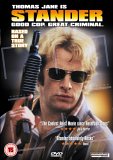![Frank Herbert's Dune--TV series [2000]](/pictures/1029311.jpg) Frank Herbert's Dune--TV series | DVD | (26/11/2001)
from £N/A
| Saving you £N/A (N/A%)
| RRP
Frank Herbert's Dune--TV series | DVD | (26/11/2001)
from £N/A
| Saving you £N/A (N/A%)
| RRP Frank Herbert's Dune is a three-part, four-and-a-half-hour television adaptation of the author's bestselling science fiction novel, telling a more complete version of the Dune saga than David Lynch's 1984 cinema film. The novel is a massive political space-opera so filled with characters, cultures, intrigues and battles that even a production twice this length would have trouble fitting everything in. While television is good at setting a scene, it loses the novel's capacity to explain how the future works, and as with Lynch's film, Frank Herbert's Dune focuses on Paul Atreides, the young noble betrayed who becomes a rebel leader--an archetypal story reworked everywhere from Star Wars (1977) to Gladiator (2000). Top-billed William Hurt is only in the first of the three 90-minute episodes, and while he gives a commanding performance, carrying the show falls to the less charismatic Alec Newman. This version is at its strongest in the ravishing Renaissance-inspired production and costume design and gorgeous lighting of Vittorio Storaro (The Last Emperor). The TV budget special effects range from awful painted backdrops to excellent CGI spaceships and sandworms. The performances are variable, from the theatrical camp of Ian McNeice as Baron Harkonnen to the subtlety of Julie Cox's Princess Iruelan. John Harrison's direction is less visionary than Lynch's, but he tells the story more coherently and ultimately the tale's the thing. --Gary S. Dalkin
 Stander | DVD | (05/09/2005)
from £5.35
| Saving you £10.64 (198.88%)
| RRP
Stander | DVD | (05/09/2005)
from £5.35
| Saving you £10.64 (198.88%)
| RRP Thomas Jane stars as a South African policeman who is behind half the crimes he's investigating.
![Broken Silence [2004]](/pictures/1032065.jpg) Broken Silence | DVD | (12/04/2004)
from £13.48
| Saving you £6.51 (32.60%)
| RRP
Broken Silence | DVD | (12/04/2004)
from £13.48
| Saving you £6.51 (32.60%)
| RRP Broken Silence features five documentaries from around the world about the Holocaust presented by Steven Spielberg's Survivors of the Shoah Visual History Foundation. The titles are: Lusi Puenzo's Some Who Lived Janos Szasz's Eyes Of The Holocaust Pavel Chukhraj's Children of The Abyss Andrzej Wajda's I Remember and Vojtech Jasny's Hell On Earth.
![Strauss: Die Fledermaus -- Bavarian State Opera [1985]](/pictures/1028697.jpg) Strauss: Die Fledermaus -- Bavarian State Opera | DVD | (19/03/2001)
from £N/A
| Saving you £N/A (N/A%)
| RRP
Strauss: Die Fledermaus -- Bavarian State Opera | DVD | (19/03/2001)
from £N/A
| Saving you £N/A (N/A%)
| RRP 
Please wait. Loading...
This site uses cookies.
More details in our privacy policy